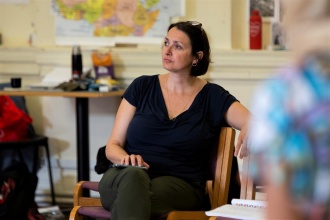This is the last article you can read this month
You can read more article this month
You can read more articles this month
Sorry your limit is up for this month
Reset on:
Please help support the Morning Star by subscribing here
ON THE first day of rehearsals for the Royal Shakespeare Company’s production of A Museum in Baghdad, writer Hannah Khalil looked around the studio at the big cast.

All but two were, like herself, of Arab descent.
“It was an emotional moment,” says the Irish-Palestinian dramatist. “I felt really proud, because that’s what I wanted to do — to write good, exciting, meaty, real parts for non-white actors.”
The play, which opens on October 11 in Stratford-upon-Avon, tells how famed British colonial administrator Gertrude Bell created the National Museum of Baghdad during the 1920s and how, in 2006, an Iraqi female archaeologist tries to save it from the chaos caused by the US-led invasion.
Thus it tells the stories of Western interventions in Iraq 80 years apart and, although based on real people and events, it breaks the rules of linear historical drama.
Characters flit across time frames, speaking to each other and the audience as the history of Iraq is collapsed into the microcosm of the museum and its fate.
And it’s also groundbreaking in telling a story of the Middle East which is not about extremism or violence, as well as of those who tell it.
One of the reasons Khalil writes, she says, is to let people of Arab and black descent play fully rounded characters.
She grew up in Dubai in the 1980s, where her Palestinian father ran a hotel.“I know so many actors from a similar heritage as me who are forced to go for the same stupid roles again and again, that are so narrow,” she says.
“I have always written Arab characters and tried to make them three-dimensional and undercut a white middle-class audience’s idea of what an Arab person is. I’ve always tried to redress that balance in my own little way.”
Khalil says she owes it to her audiences to put their mostly neglected stories, such as that of the Iraqis in A Museum in Baghdad, on stage.
She speaks from experience. “People who are of Palestinian heritage are so desperate to see themselves represented. It never happens. Or if it does, it’s in a way that’s disappointing.”
Inititally, Khalil started writing a historical drama about Bell. Then, around 2010, she attended a talk by archaeologist Lamia al-Gailani Werr, who returned to Iraq after 2003 to become director of the country’s National Museum.
The period marked some of the museum’s darkest days, as robbers looted its halls and display cases despite reassurances from the US authorities that they would protect it.
“Just one or two tanks would have prevented all this destruction,” Ghailani Werr complained at the time.
Khalil gradually built up the idea of a play set during two time periods, the one that the RSC eventually read and signed up for.
Bell’s character is played by Emma Fielding and the actor says that the play is not one in which white characters attempt to save the natives.
Her character is sympathetic, if inevitably flawed. “Now you cannot have a posh lady in a big hat saving the world any more,” she says.
That fits with Khalil’s insistence that the piece is not a black-and-white picture of Iraq’s depredations by Western colonialism — it’s a more complex work than that.
“Probably when I started researching Gertrude Bell I wanted to hate her, and thought: ‘She’s like all of them.’ But she loved Iraq, she loved Iraqis, she loved the Arab world,” she stresses.
"I don’t think the way she went about doing things was right but she meant well. And that’s the thing that’s really complicated.
“She even advocated at one point what the people of the region wanted — fluid borders. She tried to suggest that but she was laughed out of town.”
But Khalil is more certain about the invasion of 2003 and what followed. “That was a total botched job and should have never happened.”
Iraqi actor Rasoul Saghir, who plays the museum caretaker, is an important presence in the rehearsal room, linking other members of the cast and crew to a lived knowledge of the country, as is the case with the play’s assistant director Yasmeen Ghaury, also Iraqi.
The project is immensely personal for Saghir, he says, and often emotionally challenging. “It is a difficult and terrible journey, he says, “a very bad history to remember."
The son of an Iraqi communist who opposed Saddam Hussein, he was jailed and tortured by the regime, eventually fleeing the country — and conscription — via Jordan as war loomed in 1990.
“We have some scenes in this play that took me back,” he says, referring to events in his life or those of family members. “My father was also a communist, so he was against Saddam Hussein. He was imprisoned and tortured.”
After years stuck in Yemen, Saghir resettled in Holland in 1996. He was teaching theatre in Kuwait when he got a call from a friend about the RSC part earlier this year.
After being cast in the role, he went to Baghdad and read the whole play to his father. At the end his father said of Khalil: “Yes, that’s right, that’s it, she’s Iraqi!”
That, says Khalil, is the accolade she cherishes the most. “I was like, that’s very nice, I’ll take that.”
A Museum in Baghdad runs from October 11 to January 20, box office: rsc.org.uk. A fuller version of this article is available at Middle East Eye, middleeasteye.net.












